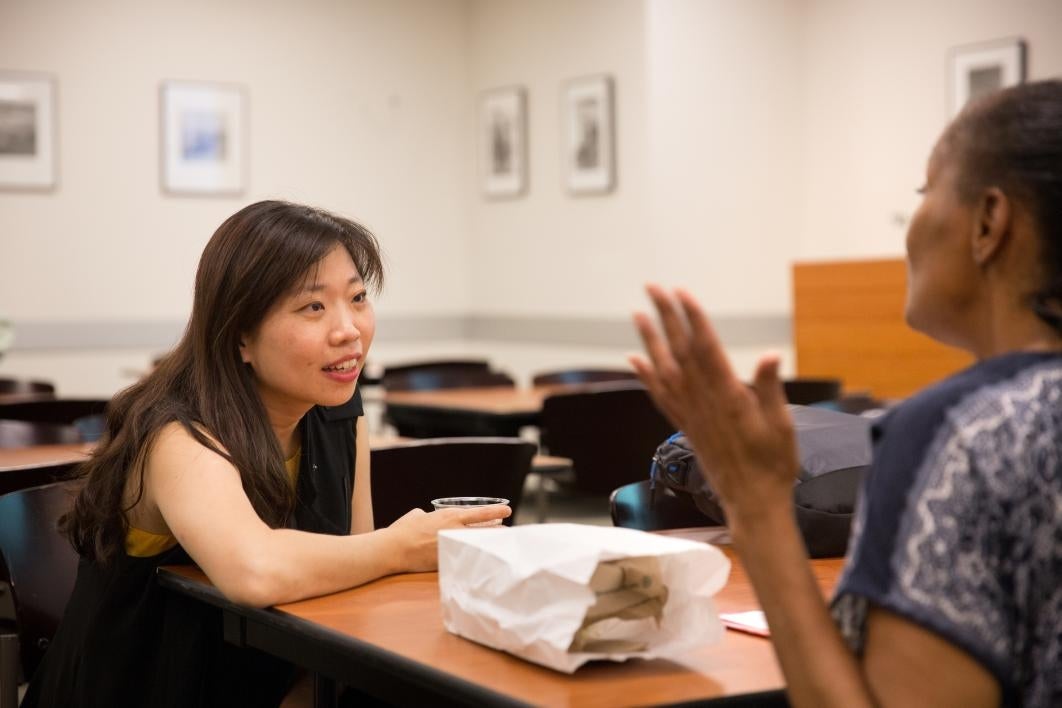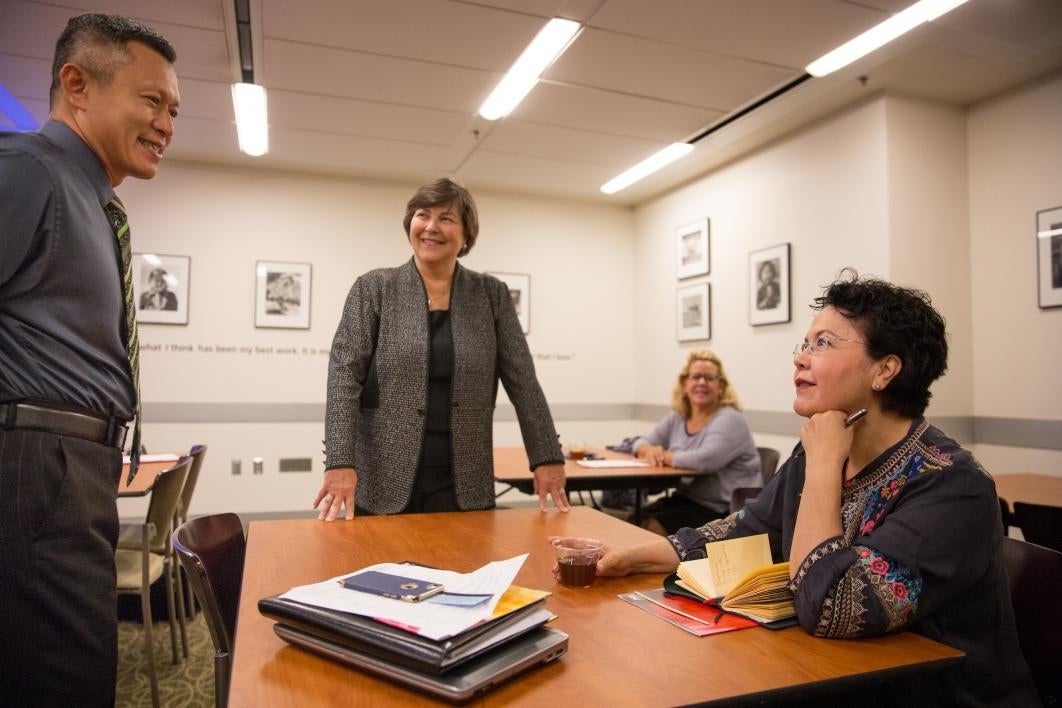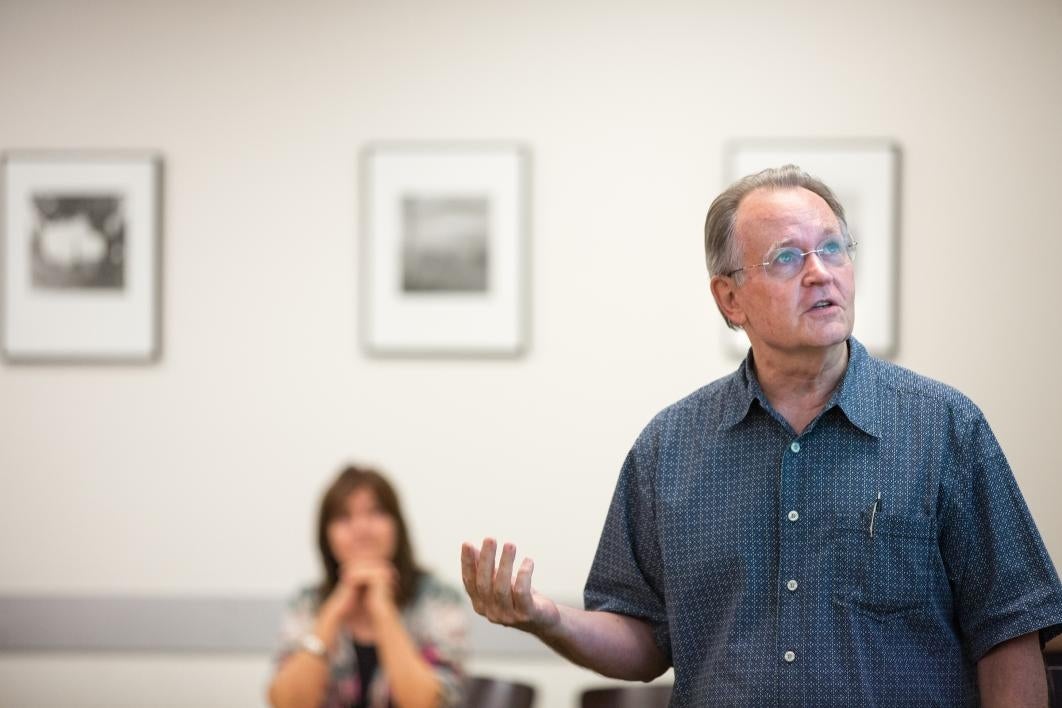ASU Japanese Lecturer Bradley Wilson wishes his American students knew more about the cultural influences behind the anime comics they love so much. Chandler Gilbert Community College Adjunct Professor Elizabeth Daly wants to make sure her composition courses are catering to a changing student demographic. Jacque Starks, diversity coordinator for Maricopa County Community Colleges, hopes to be a resource for faculty who want to know more about the Asian experience.
“There are so many stereotypes and misunderstandings” about such a vast area of the world, Starks said.
That’s why she, Wilson and Daly all attended the Engaging Asia workshop last week at Arizona State University’s Tempe campus. The workshop, hosted by ASU’s Center for Asian Research, served as an introduction to the center’s Asia Mediated project and a chance for local community college faculty and staff to network with one another as well as ASU faculty and staff.
“This event came out of a desire to connect better with community colleges and examine ways we might collaborate and better serve all of our students,” said Maria Hesse, ASU vice provost for academic partnerships and a former community college professor herself. “It’s a way to have a conversation about what we might be doing together to advance this area.”
The Engaging Asia workshop is just one way ASU Professors Juliane SchoberJuliane Schober is a professor in ASU’s School of Historical, Philosophical and Religious Studies. and Pauline CheongPauline Cheong is a professor in ASU’s Hugh Downs School of Human Communication. have been working to increase knowledge and understanding of that area since receiving a two-year U.S. Department of Education UISFLUndergraduate International Studies and Foreign Language Program grant to fund the Asia Mediated project last year.
They’ve also developed a lunch and lecture series; a new multimedia course, COM 394: Digital Media, Culture and Communication in Asia; a suite of open-source online modules; and an internship program for Barrett Honors students.
“Asia is more than 40 countries, with a whole spectrum of media [platforms], from traditional media to brand-new digital applications,” Cheong said. “So we are talking about a rather deep and broad, rapidly evolving terrain.”
However, it’s a terrain not often trod by those in Western countries, resulting in a potentially problematic knowledge gap.
“What happens in Asia doesn’t just stay in Asia. It’s not like Vegas,” Cheong said. “It affects us here [in America and other Western countries] in our everyday lives.”
The Asian influence is felt in a variety of areas, from tech hardware to immigration to entertainment — not to mention the internet. Asians make up about 50 percent of internet users worldwide, Cheong said.
“In terms of internet users, Asians dominate the scene. … I tell my students, if you’re studying anything to do with communication technologies and Asia, you are the future,” Cheong said.
Biological sciences and Asian Pacific American studies double-major Ronae Matriano was one of three Barrett Honors students chosen to work as interns for the Asia Mediated project. Together, they helped translate ASU professors’ research into two weeks' worth of online course material, available to anyone. Each module covers a different topic, such as Wilson’s “The Shadow of WWII” and ASU history Professor James Rush’s “Truth to Power: Activist Journalism in Southeast Asia.”
“Each professor has a unique and interesting field of study, and being able to work side-by-side with them to put their research into a module for use state-wide, and possibly even internationally, has been invaluable to my learning,” Matriano said. “I have not only learned more about Asia, but I have also developed skills for module development and communication.”
Both Wilson and Rush presented their modules to the community college faculty and staff at the Engaging Asia workshop. Cheong hopes the open-access material will get all educators thinking about “teaching to a larger audience and engaging the wider community.”
The Asia Mediated lunch and lecture series will begin Thursday, Oct. 19, with a talk by Aswin Punathambekar, associate professor and director of the Global Media Studies initiative at the University of Michigan. His talk, “A Sound Bridge: Listening for the Political in Digital South Asia,” will explore the centrality of sound and listening practices in the mediation of politics and citizenship in Indian public culture.
During the final year of funding, Cheong and Schober have plans to compile all the activities and knowledge accumulated for Asia Mediated into an electronic book of sorts. Cheong hesitates to use the word “book” because it will be highly interactive, with hyperlinks, keyword search capabilities and a linked index and glossary.
All of the faculty who have contributed “have been tremendous, and very creative,” Cheong said. She hopes the project and the resulting compilation will serve as an enduring resource for students, faculty and the community.
“Not everybody learns from lectures or multiple-choice questions,” she said. “[Asia Mediated provides] a new way of learning that’s more interactive and textured, so that the subject matter becomes richer and more memorable.”
It’s how Schober, Cheong and their ASU colleagues across different campuses are trying to “do a better job of teaching and engaging in these critical issues.”
More Arts, humanities and education

ASU workshop trains educators, professionals from marginalized communities in disaster science
As devastating as hurricanes can be to anyone caught in their paths, they strike marginalized communities even harder.To address this issue, a fund named for a former Arizona State University…

ASU’s Humanities Institute announces 2024 book award winner
Arizona State University’s Humanities Institute (HI) has announced “The Long Land War: The Global Struggle for Occupancy Rights” (Yale University Press, 2022) by Jo Guldi as the 2024…

Retired admiral who spent decades in public service pursuing a degree in social work at ASU
Editor’s note: This story is part of coverage of ASU’s annual Salute to Service.Cari Thomas wore the uniform of the U.S. Coast Guard for 36 years, protecting and saving lives, serving on ships and…



